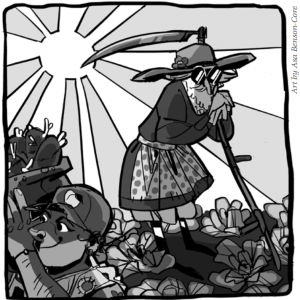The 2008 Farm Bill ushered in a suite of programs that support the development of local and regional food systems, market diversification opportunities for farmers, healthy food access initiatives and other innovative programs that seize upon the great potential of food to bolster local economies, create jobs and deepen the connection between farmers and eaters.
Our hope for this Farm Bill was continued support for these programs and an expansion of access to healthy food for all Americans. By and large, this was a bright spot in the bill, which is no small feat given how hard our communities have had to fight to make the case that local food systems represent worthy investments in rural economies, public health, job creation and farmer livelihoods. Farm Aid celebrates the great power of food to connect people and grow strong communities, as well as the farmers and ranchers at the root of our food system.
What we found to like
We love LAMP. A number of scrappy programs that spurred local and regional food systems over the last decade have consistently been fighting for funding. This farm bill combines two of our favorites – the Value-Added Producer Grant (VAPG) program and Farmers Market and Local Food Promotion Program (FMLFPP) – into a new program called the Local Agriculture Market Program (LAMP). The Farm Bill provides these programs with permanent funding and makes significant policy improvements.The 2018 Farm Bill also reauthorizes the Rural Energy for America Program (REAP), which will receive $50 million per year in mandatory funds in perpetuity, the National Sustainable Agriculture Information Service / Appropriate Technology Transfer for Rural America (ATTRA), Business and Industry Loan Guarantees Local & Regional Food Enterprise Set-aside, and expands the Healthy Food Financing Initiative.
Rural matters. The 2018 Farm Bill overturns the outrageous decision made last year by Secretary of Agriculture Sonny Perdue to eliminate the position of an Undersecretary for Rural Development. The bill now mandates this position’s existence.
Urban matters, too. The 2018 Farm Bill establishes a new “Office of Urban Agriculture and Innovative Forms of Production” with $25 million per year in appropriations authority, a 15-member advisory committee and competitive grants authority. It instructs the creation of 10 pilot Urban and Suburban County Committees and creates a community compost and reducing food waste pilot. The bill also includes $10 million annually in mandatory funding for research grants in urban agriculture.
‘Let food be thy medicine.’ This bill reauthorizes the Food Insecurity Nutrition Incentives Program and renamed it the Gus Schumacher Nutrition Incentive Program (named after a hero of ours who worked tirelessly to ensure that everyone has access to good food). The program will receive $250 million over 5 years and includes a produce prescription program.
A better SNAP. The bill extends funding for the Supplemental Nutrition Assistance Program (SNAP, formerly called ‘food stamps’) without the rigid and bureaucratic work requirements initially placed in the House version of the bill. Those provisions would have deepened hunger and poverty for vulnerable Americans, including children and families. The bill also instructs USDA to allow farmers markets to operate an individual EBT device for accepting SNAP benefits at more than one location.
What we found disappointing
Farm to school. The 2018 Farm Bill fails to provide additional mandatory funding for the USDA Farm to School Grant Program and does not provide for the regulatory flexibility that would allow school food authorities to procure local and regional food and farm products.
Where’s the money? This bill reduces mandatory funding for the Community Food Projects grant program by $4 million and does not provide mandatory funding for the Food Safety Outreach Program.
What we found unconscionable:
Boondoggle for the big guys: The 2018 Farm Bill widens loopholes for wealthy mega-farms to exploit commodity and crop insurance subsidies, allowing nieces, nephews, and cousins who may have never worked on the farm to receive taxpayer-funded subsidies. This will continue to drive consolidation in the farm sector, allowing the biggest farms to keep growing and gobble up smaller and midsized operations that are so critical to the wellbeing of rural communities.
Farm Aid is a nonprofit organization whose mission is to keep family farmers on the land. Willie Nelson, Neil Young and John Mellencamp organized the first Farm Aid concert in 1985 to raise awareness about the loss of family farms and to raise funds to keep farm families on the land. Farm Aid has raised more than $53 million to promote a strong and resilient family farm system of agriculture.
This article is excerpted with permission from the Farm Aid blog at www.farmaid.org

Be First to Comment